>Module 10 Spring Festival Unit 3 Language in use 课件(共47张PPT)
文档属性
| 名称 | >Module 10 Spring Festival Unit 3 Language in use 课件(共47张PPT) |
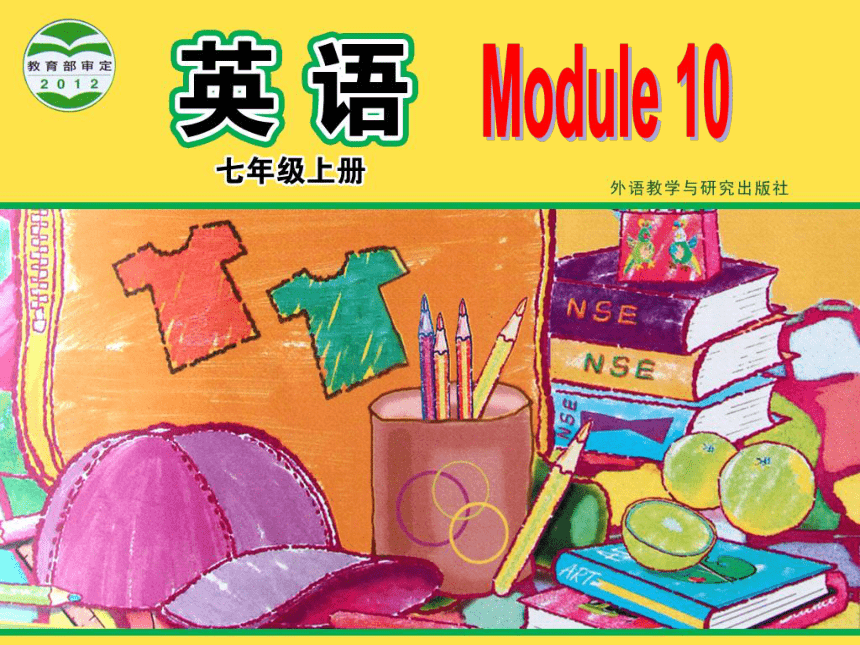
|
|
| 格式 | zip | ||
| 文件大小 | 1.4MB | ||
| 资源类型 | 试卷 | ||
| 版本资源 | 外研版 | ||
| 科目 | 英语 | ||
| 更新时间 | 2021-10-22 00:00:00 | ||
图片预览

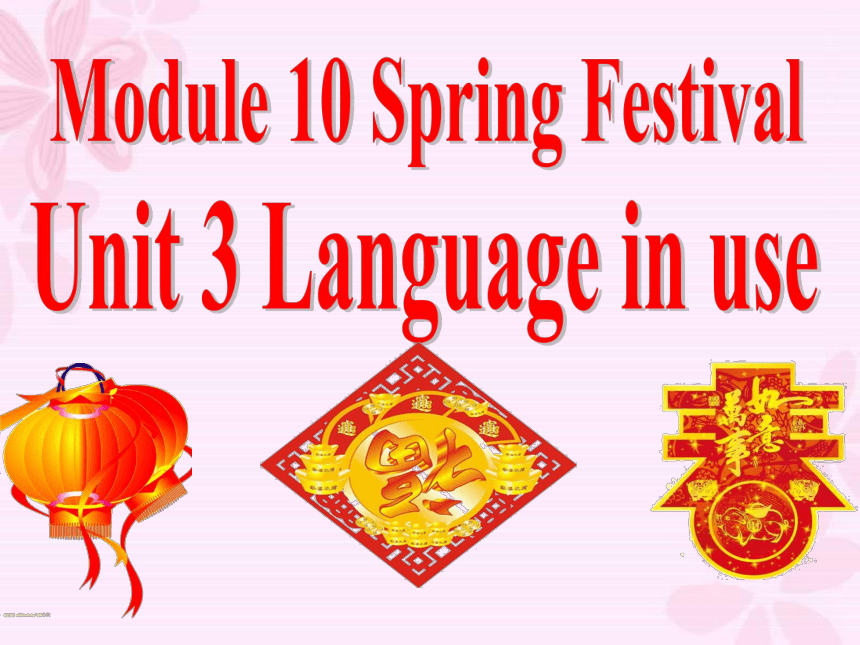
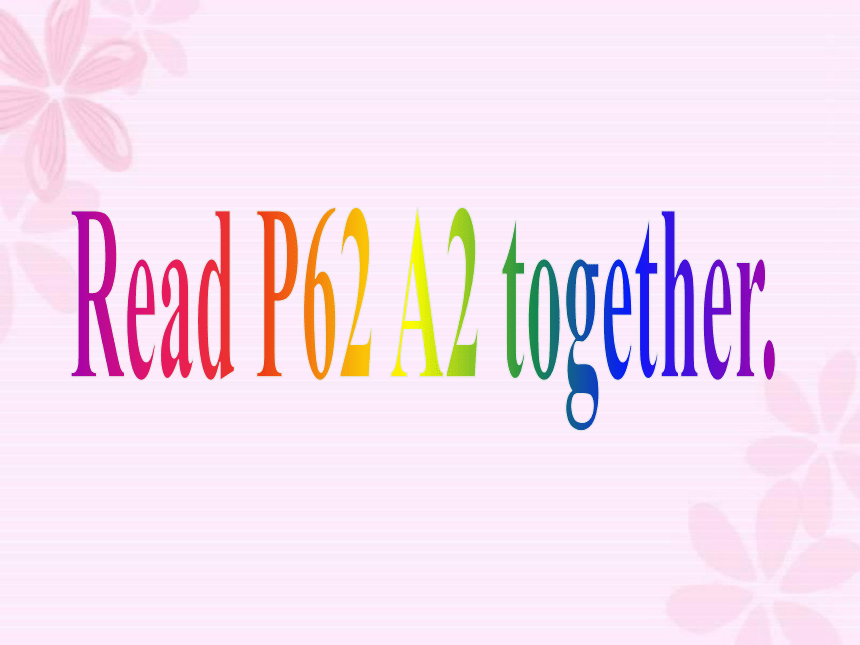
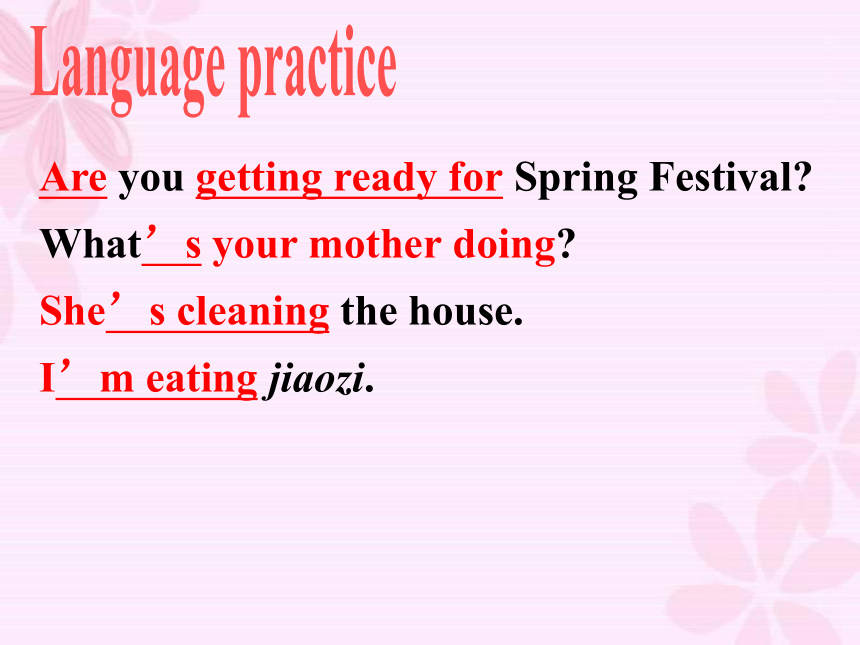
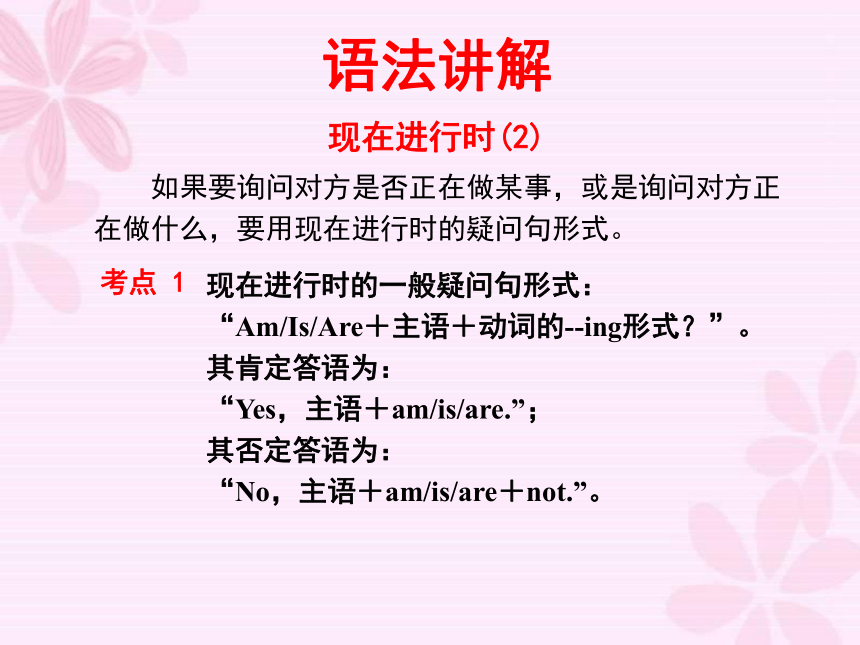
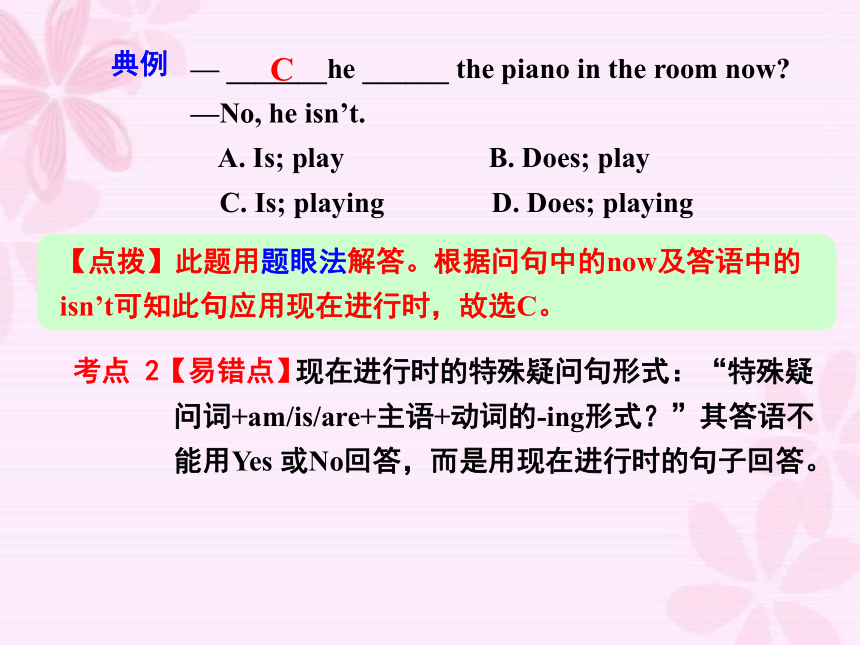
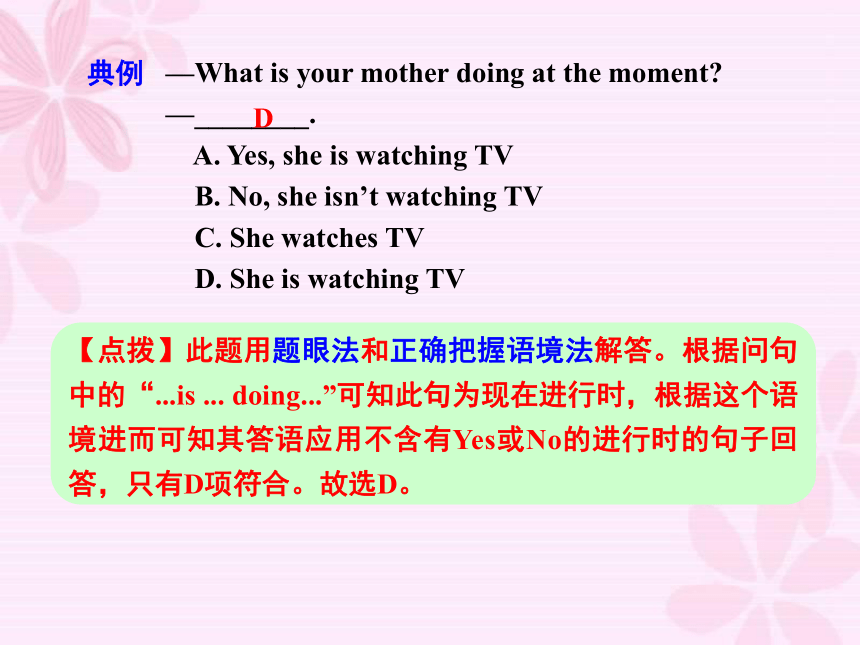
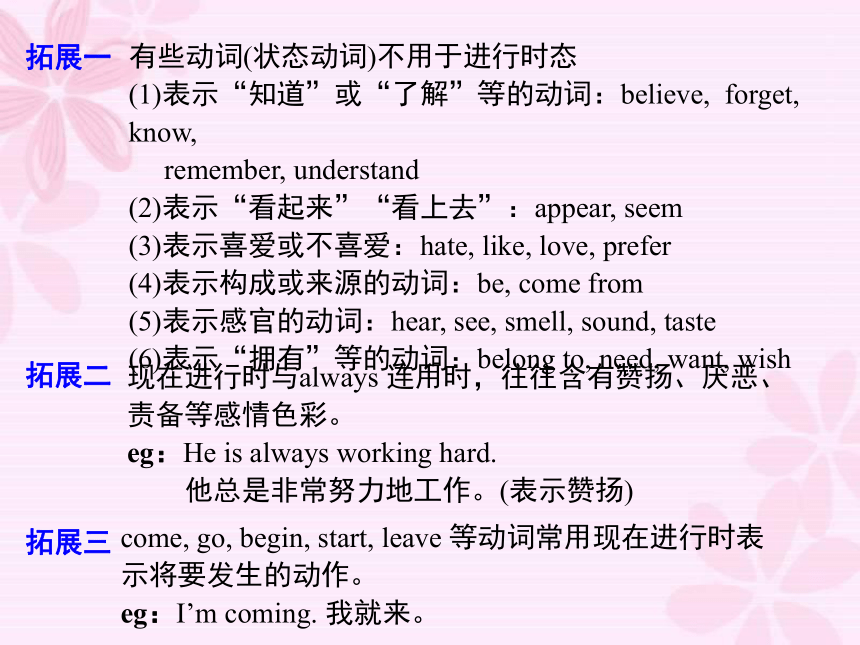
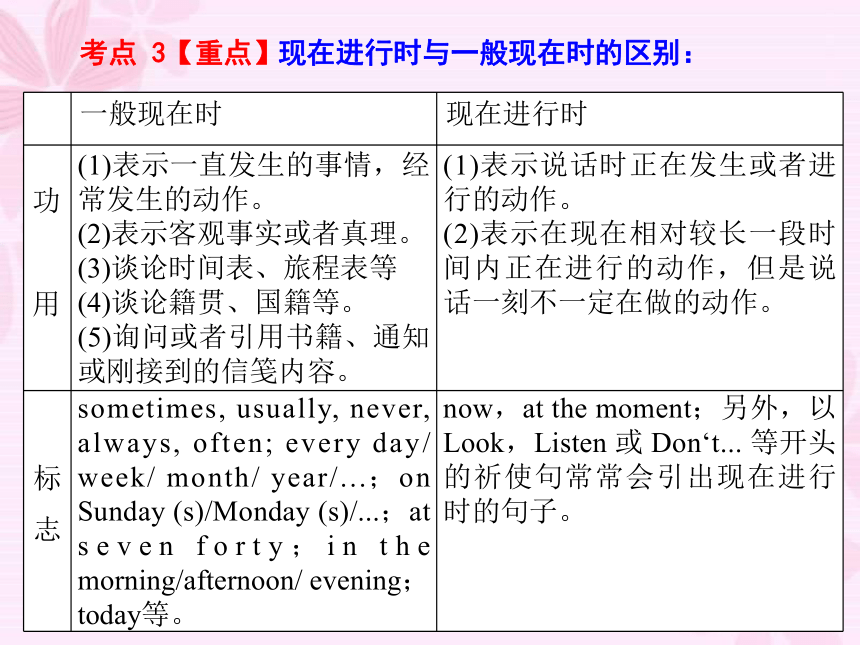
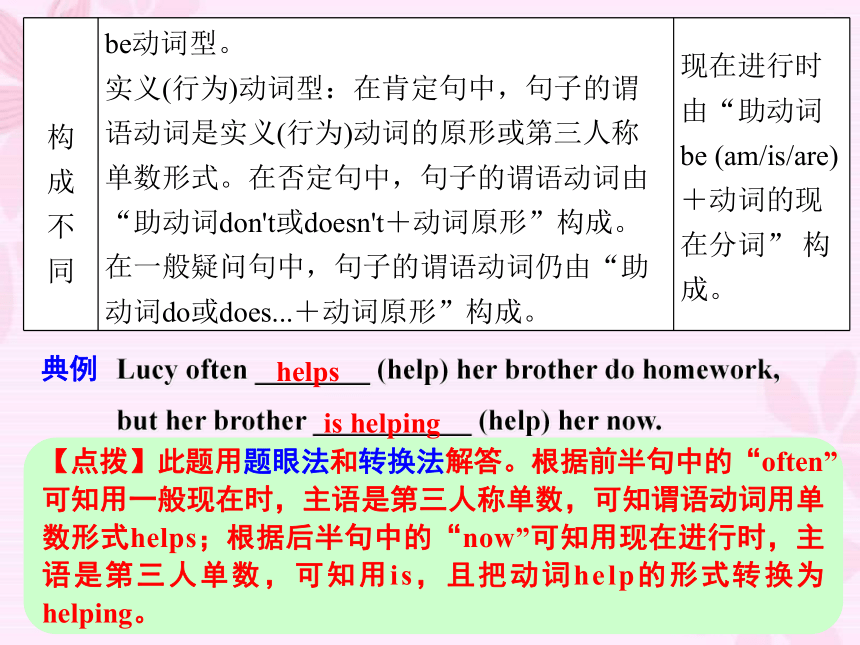

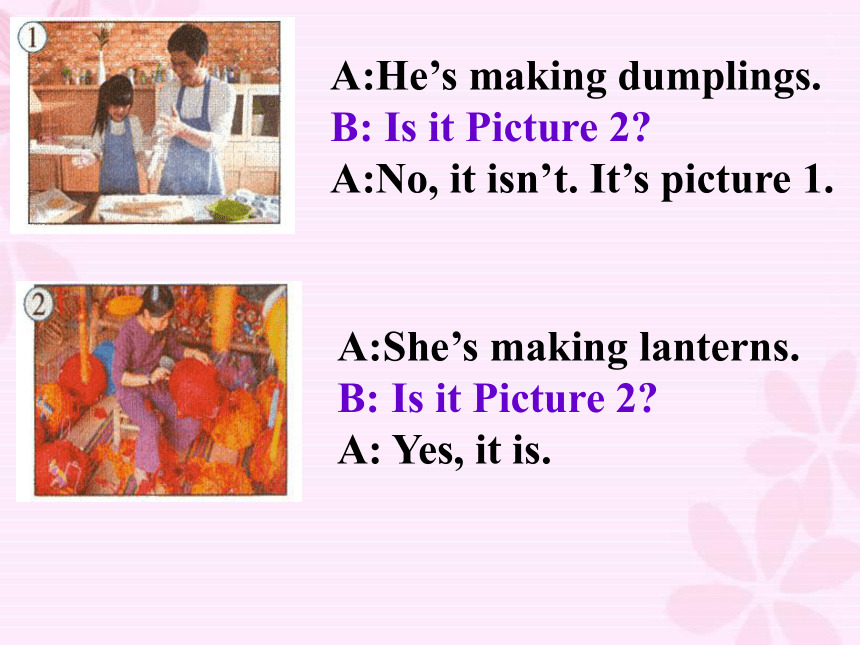
文档简介
(共47张PPT)
Are you getting ready for Spring Festival What’s your mother doing She’s cleaning the house.
I’m eating jiaozi.
现在进行时(2)
语法讲解
如果要询问对方是否正在做某事,或是询问对方正在做什么,要用现在进行时的疑问句形式。
现在进行时的一般疑问句形式:
“Am/Is/Are+主语+动词的 -ing形式?”。
其肯定答语为:
“Yes,主语+am/is/are.”;
其否定答语为:
“No,主语+am/is/are+not.”。
考点 1
典例
— _______he ______ the piano in the room now
—No, he isn’t.
A. Is; play B. Does; play
C. Is; playing D. Does; playing
C
【点拨】此题用题眼法解答。根据问句中的now及答语中的 isn’t可知此句应用现在进行时,故选C。
现在进行时的特殊疑问句形式:“特殊疑问词+am/is/are+主语+动词的-ing形式?”其答语不能用Yes 或No回答,而是用现在进行时的句子回答。
考点 2【易错点】
典例
—What is your mother doing at the moment
—________.
A. Yes, she is watching TV
B. No, she isn’t watching TV
C. She watches TV
D. She is watching TV
D
【点拨】此题用题眼法和正确把握语境法解答。根据问句中的“...is ... doing...”可知此句为现在进行时,根据这个语境进而可知其答语应用不含有Yes或No的进行时的句子回答,只有D项符合。故选D。
拓展一
有些动词(状态动词)不用于进行时态
(1)表示“知道”或“了解”等的动词:believe, forget, know,
remember, understand
(2)表示“看起来”“看上去”:appear, seem
(3)表示喜爱或不喜爱:hate, like, love, prefer
(4)表示构成或来源的动词:be, come from
(5)表示感官的动词:hear, see, smell, sound, taste
(6)表示“拥有”等的动词:belong to, need, want, wish
拓展二
现在进行时与always 连用时,往往含有赞扬、厌恶、责备等感彩。
eg:He is always working hard.
他总是非常努力地工作。(表示赞扬)
拓展三
come, go, begin, start, leave 等动词常用现在进行时表示将要发生的动作。
eg:I’m coming. 我就来。
现在进行时与一般现在时的区别:
考点 3【重点】
一般现在时 现在进行时
功
用 (1)表示一直发生的事情,经常发生的动作。
(2)表示客观事实或者真理。
(3)谈论时间表、旅程表等
(4)谈论籍贯、国籍等。
(5)询问或者引用书籍、通知或刚接到的信笺内容。 (1)表示说话时正在发生或者进行的动作。
(2)表示在现在相对较长一段时间内正在进行的动作,但是说话一刻不一定在做的动作。
标
志 sometimes, usually, never, always, often; every day/ week/ month/ year/...;on Sunday (s)/Monday (s)/...;at seven forty;in the morning/afternoon/ evening;today等。 now,at the moment;另外,以Look,Listen 或 Don‘t... 等开头的祈使句常常会引出现在进行时的句子。
构
成
不
同 be动词型。
实义(行为)动词型:在肯定句中,句子的谓语动词是实义(行为)动词的原形或第三人称单数形式。在否定句中,句子的谓语动词由“助动词don't或doesn't+动词原形”构成。在一般疑问句中,句子的谓语动词仍由“助动词do或does...+动词原形”构成。 现在进行时由“助动词be (am/is/are)
+动词的现在分词” 构成。
典例
Lucy often ________ (help) her brother do homework, but her brother ___________ (help) her now.
【点拨】此题用题眼法和转换法解答。根据前半句中的“often”可知用一般现在时,主语是第三人称单数,可知谓语动词用单数形式helps;根据后半句中的“now”可知用现在进行时,主语是第三人单数,可知用is,且把动词help的形式转换为helping。
helps
is helping
Students A: Choose a picture.
Say what the people are doing.
Students B: Guess which picture
Students A is describing.
A: They are watching TV.
B: Is it Picture 4 A: Yes, it is. / No, it isn’t.
1 Work in pairs
A:He’s making dumplings.
B: Is it Picture 2
A:No, it isn’t. It’s picture 1.
A:She’s making lanterns.
B: Is it Picture 2
A: Yes, it is.
A: She’s playing a computer
game.
B: Is it Picture 3
A: Yes, it is.
A: They’re performing
lion dances
B: Is it Picture 3
A: No, it isn’t. It’s picture 5.
Lingling’s mother / learning a lion dance
—Is Lingling’s mother learning a lion dance
— No, she isn’t.
2 Write questions and short answers.
1. Lingling’s mother / cleaning the house
2. Lingling’s father / making lanterns
3. Lingling’s aunt / cooking the meal
4. Lingling’s grandma / sweeping the floor
5. Daming and Betty / learning a lion dance
---- Is Lingling’s mother cleaning the house
----Yes, she is.
---- Is Lingling’s father making lanterns
---- No, he isn’t.
---- Is Lingling’s aunt cooking the meal
---- No, she isn’t.
---- Is Lingling’s grandma sweeping the floor
---- No, she isn’t.
---- Are Daming and Betty learning a lion dance
---- No, they aren’t.
3 Write question and answers about the pictures
in Activity 1.
What’s the boy doing
- He is using a computer.
Picture 1
-What are the girl and her father doing
-They are making dumplings.
Picture 2
-What is the woman doing
-She is making lanterns.
Picture 3
Picture 4
-What are they doing
-They are watching TV.
Picture 5
What are they doing
- They are performing lion dances.
At the moment, we _______________ (get ready) for Spring Festival. We ___________ (clean) the house and we ____________ (sweep) the floor. My mother _________ (cook) a meal. My father doesn’t _____ (work) today. We always ____ (buy) new clothes for Spring Festival. We always ___ (get) presents from our family and friends. Spring Festival finishes at Lantern Festival, and we often ____(eat) yuanxiao on that day.
4 Complete the passage with the correct form of the
worlds and expression in brackets.
are getting ready
are cleaning
are sweeping
is cooking
work
buy
get
eat
知识点
1
finish/'f n /v.完成,结束
eg: Can you finish the work before 11 o'clock 11点钟之前你能完成这份工作吗?
考向
finish doing sth.做完某事
— Can you finish ________ these books before 10 o’clock
—Yes, I can.
A. to read B. read C. reads D. reading
典例
【点拨】此题考查非谓语动词的用法。finish后面要跟名词或动名词作宾语,故选D。
D
3. We usually have a traditional family dinner on New Year’s Eve and then watch a special programme on TV.
5 Work in pairs. Find four things that you
both do at Spring Festival and report to
the class.
1. We usually clean the house .
2. We buy new clothes.
4. We often play fireworks at midnight.
5. We sometimes visit our friends.
Christmas and Father Christmas
Christmas is the most important festival in most Western countries. Children usually like Christmas a lot because of Father Christmas, Santa Claus. He is a fat man with long white beard and he wears a red suit. He visits people on Christmas Eve and Christmas Day, and gives presents to children, so they love him very much.
知识点
2
the most important 最重要的
eg: The most important thing is to keep healthy. 最重要的是保持健康。
拓展
一个形容词或副词往往有三个级:原级,比较级,最高级。这里是最高级,表示三者或三者以上的人或物进行比较。形容词的最高级前面要加定冠词the,副词最高级前面的the可以省略。
在含有最高级的句子中,常用一个in/of短语来表示比较范围。如果这个形容词或副词是多音节(极少双音节)词,前加most构成最高级。
eg:the most interesting 最有趣
—Do you know Lin Shuhao
—Yes. He is one of ________ basketball players in the NBA.
A. popular B. more popular C. the most popular
典例
【点拨】此题用题眼法解答。根据题眼in可知用最高级。故选C。
C
知识点
3
because of 因为
eg: The boy can’t go to school because of his age.
因为他的年龄,这个男孩不能去上学。
考向【易错点】
辨析because of,because
because of介词短语,后接名词(短语)或代词。
because连词,引导原因状语从句,用于回答why提出的问题。
选用because, because of完成下列句子:
(1) He walked slowly ____________ his bad leg.
(2) She is never late for school __________ she gets up early every morning.
典例
because of
because
Module task: Writing a letter about Spring Festival to a foreign student
6 Ask and answer questions about what you and your family are doing for Spring Festival at the moment.
- What are you and your family doing for
Spring Festival at the moment
- My mother is cooking the meal.
My grandparents are making lanterns.
My father is cleaning the house.
I am helping to sweep the floor.
We are all very busy.
7 Write notes about your Spring Festival.
use the heading to help you.
Getting ready
clean the house
sweep the floor
cook the meal
learn the dragon dance
make the lanterns
paint the doors and windows red
buy the new clothes
have a haircut
Food
Niangao (rice pudding)
jiaozi (dumpling)
yuanxiao (rice dumpling)
Presents
new clothes
lucky money
play/watch fireworks at midnight
visit family and friends
watch dragon and lion dancing
put on new clothes
Traditions
8 Write a letter to a friend saying:
What you’re doing for Spring Festival
at the moment.
What you usually do.
Dear Lily,
Here in China it’s the Spring Festival and
we’re getting ready.
My mother is …
Usually we … and we…
Tell me about a festival in your country.
Best wishes,
Tom
称呼 (name)
署名(your name)
Use your notes in Activities 6and 7.
知识点
4
英语中写信的一般格式:
a 信头(heading)
信头包括写信人地址和写信日期,通常写在信笺的右上角。在比较熟识的朋友之间的通信,写信人的地址、日期常可略去。日期通常有下列两种写法:
a)月、日、年:如August 15, 2013
b)日、月、年:如15th August, 2013
地址的写法通常是由小到大,如:门牌号、街道名、市(县)名、省名、国名(邮政编码通常写在城市名之后)。这同中文书信的地址写法完全相反。地址可以写1~3行,日期写在地址的下方。
b 称呼 (salutation)
称呼指写信人对收信人的称呼,如Dear Xiaojun, 写在信头的下方和信笺的左边。称呼一般用Dear... 或My dear...开头,称呼后一般用逗号。
c 正文 (body)
这是书信的主体部分,即写信人要表达的内容。 正文要求语句通顺,层次分明,表意清楚。可以 手写,也可以打印。
d 结束语 (complimentary close)
它是书信结尾的恭维话。
e 签名 (signature)
签名通常签在结束语下方的中间偏右的位置。签名应是亲笔书写,即使是打印机打出的信件,最 后仍需亲笔签名。在签名的上方可根据写信人和 收信人的关系写上Sincerely yours/Yours sincerely
(用于不相识的人),或Respectfully yours / Yours respectfully(用于对长辈或上级)。
知识点
5
tell/tel/v.讲;告诉
eg: Grandpa is telling stories to the children in the room.
祖父正在房间里给孩子们讲故事。
He tells me that he likes baseball. 他告诉我他喜欢棒球运动。
考向
tell sb. (not) to do sth.告诉某人(不)做某事
eg:He tells me not to drive too fast.
他叫我 (开车) 不要开得太快。
Our teacher often tells us ______ in the river. It’s dangerous.
A. don’t swim B. not swim
C. not to swim D. not swimming
典例
【点拨】此题考查固定搭配。tell sb.to do sth.告诉某人做某事;tell sb.not to do sth.告诉某人别做某事。根据后句“太危险了。”可知前句句意为 “老师常常告诉我们不要在河里游泳。”,用not to swim。 故选C。
C
拓展
有关tell的词组:
tell A from B 区分A与B
tell a lie 说谎
tell of sth.公布;说明
tell time 报时
tell sb. about sth.告诉某人某事
Dear Linda,
Here in China it’s the Spring Festival and we’re getting ready. My mother is cleaning the house and my father is helping her. Usually we have a big family dinner and we watch a special TV programme in the evening to celebrate the festival.
Tell me about a festival in your country.
Love from,
Lucy
Possible answer:
Dear Linda,
We’re getting ready for Spring Festival. My mother is cleaning the house and sweeping away bad luck. My father is sweeping the floor. My grandma is cooking dinner in the kitchen. I am making big red lanterns. We usually celebrate Spring Festival with a traditional family dinner on the evening before Spring Festival. We always eat lots of jiaozi—a kind of dumpling. After dinner, we always watch a special programme on TV. Tell me about a festival in your country. Love from,
Lucy.
小结提升。
这节课我学到了:
1. 学习单词: merry, tell;
2. 并复习巩固单元内所学词汇;
3. 掌握现在进行时的疑问句形式。
一、用所给单词的适当形式填空。
1. —Is your mother at home
—Yes. She ___________ (put) things away.
2. —Where are your parents
—Oh, they are in Florence and __________ (celebrate) their
25th wedding anniversary.
3. Listen! Who _________ (sing) in the room
4. Would you mind turning down the music I ___________
(write) a report now.
5.—Where is Linda
—Oh, she _________ (lie) in bed.
is putting
celebrating
is singing
am writing
is lying
二、单项选择。
6. Be quiet! I ________ my homework.
A. am doing B. have done C. do D. did
A
【点拨】根据语境可知,暗指现在,故用现在进行时。
7. —You look worried. What’s wrong
—I went for a job interview(面试) yesterday and I ________
the result.
A. waited for B. was waiting for
C. am waiting for D. will wait for
C
【点拨】根据问句中的语境,“彼得能和我们一起玩游戏吗?”,暗指现在,故要用现在进行时。
8. —Can Peter play games with us,Mrs. Hawking
—Wait a minute. He ________ a shower.
A. is taking B. takes C. take D. was taking
A
9. —May I speak to the headmaster(校长)
—He ________ a meeting now. Can I take a message(捎信)
A. have B. has C. is hasing D. is having
D
【点拨】根据句中关键词now可知要用现在进行时,故选D。
10. Turn off the water while(当……时) you _____ your teeth or
washing your hands.
A. were brushing B. brush
C. are brushing D. brushed
C
三、按要求完成句子。
11. My parents are making cakes for me.(改为一般疑问句 , 并
作肯定回答)
_______ ______ parents ________ cakes for you
________, ________ ________.
12. We are cleaning the classroom.(改为一般疑问句,并作否定
回答)
______ you ________ the classroom
______, ______ _______.
13. My mother is washing some clothes.(改为否定句)
My mother ______ washing _____ clothes.
14. Daming is sweeping the floor.(对画线部分提问)
______ _____ sweeping the floor
15. Lingling and Daming are reading.(对画线部分提问)
_______ _____ Lingling and Daming ________
Are your
Yes they are
Are
No we aren’t
making
cleaning
isn’t
any
Who is
What are
doing
Homework
1. 抄写单词,每个3遍,每个短语3遍,意思一遍。
2. 读熟U1的对话,U2的短文,记住本模块所学单词、短语、句型和知识点。
3. 完成本单元的练习册。
4. 预习下节课的内容。
Are you getting ready for Spring Festival What’s your mother doing She’s cleaning the house.
I’m eating jiaozi.
现在进行时(2)
语法讲解
如果要询问对方是否正在做某事,或是询问对方正在做什么,要用现在进行时的疑问句形式。
现在进行时的一般疑问句形式:
“Am/Is/Are+主语+动词的 -ing形式?”。
其肯定答语为:
“Yes,主语+am/is/are.”;
其否定答语为:
“No,主语+am/is/are+not.”。
考点 1
典例
— _______he ______ the piano in the room now
—No, he isn’t.
A. Is; play B. Does; play
C. Is; playing D. Does; playing
C
【点拨】此题用题眼法解答。根据问句中的now及答语中的 isn’t可知此句应用现在进行时,故选C。
现在进行时的特殊疑问句形式:“特殊疑问词+am/is/are+主语+动词的-ing形式?”其答语不能用Yes 或No回答,而是用现在进行时的句子回答。
考点 2【易错点】
典例
—What is your mother doing at the moment
—________.
A. Yes, she is watching TV
B. No, she isn’t watching TV
C. She watches TV
D. She is watching TV
D
【点拨】此题用题眼法和正确把握语境法解答。根据问句中的“...is ... doing...”可知此句为现在进行时,根据这个语境进而可知其答语应用不含有Yes或No的进行时的句子回答,只有D项符合。故选D。
拓展一
有些动词(状态动词)不用于进行时态
(1)表示“知道”或“了解”等的动词:believe, forget, know,
remember, understand
(2)表示“看起来”“看上去”:appear, seem
(3)表示喜爱或不喜爱:hate, like, love, prefer
(4)表示构成或来源的动词:be, come from
(5)表示感官的动词:hear, see, smell, sound, taste
(6)表示“拥有”等的动词:belong to, need, want, wish
拓展二
现在进行时与always 连用时,往往含有赞扬、厌恶、责备等感彩。
eg:He is always working hard.
他总是非常努力地工作。(表示赞扬)
拓展三
come, go, begin, start, leave 等动词常用现在进行时表示将要发生的动作。
eg:I’m coming. 我就来。
现在进行时与一般现在时的区别:
考点 3【重点】
一般现在时 现在进行时
功
用 (1)表示一直发生的事情,经常发生的动作。
(2)表示客观事实或者真理。
(3)谈论时间表、旅程表等
(4)谈论籍贯、国籍等。
(5)询问或者引用书籍、通知或刚接到的信笺内容。 (1)表示说话时正在发生或者进行的动作。
(2)表示在现在相对较长一段时间内正在进行的动作,但是说话一刻不一定在做的动作。
标
志 sometimes, usually, never, always, often; every day/ week/ month/ year/...;on Sunday (s)/Monday (s)/...;at seven forty;in the morning/afternoon/ evening;today等。 now,at the moment;另外,以Look,Listen 或 Don‘t... 等开头的祈使句常常会引出现在进行时的句子。
构
成
不
同 be动词型。
实义(行为)动词型:在肯定句中,句子的谓语动词是实义(行为)动词的原形或第三人称单数形式。在否定句中,句子的谓语动词由“助动词don't或doesn't+动词原形”构成。在一般疑问句中,句子的谓语动词仍由“助动词do或does...+动词原形”构成。 现在进行时由“助动词be (am/is/are)
+动词的现在分词” 构成。
典例
Lucy often ________ (help) her brother do homework, but her brother ___________ (help) her now.
【点拨】此题用题眼法和转换法解答。根据前半句中的“often”可知用一般现在时,主语是第三人称单数,可知谓语动词用单数形式helps;根据后半句中的“now”可知用现在进行时,主语是第三人单数,可知用is,且把动词help的形式转换为helping。
helps
is helping
Students A: Choose a picture.
Say what the people are doing.
Students B: Guess which picture
Students A is describing.
A: They are watching TV.
B: Is it Picture 4 A: Yes, it is. / No, it isn’t.
1 Work in pairs
A:He’s making dumplings.
B: Is it Picture 2
A:No, it isn’t. It’s picture 1.
A:She’s making lanterns.
B: Is it Picture 2
A: Yes, it is.
A: She’s playing a computer
game.
B: Is it Picture 3
A: Yes, it is.
A: They’re performing
lion dances
B: Is it Picture 3
A: No, it isn’t. It’s picture 5.
Lingling’s mother / learning a lion dance
—Is Lingling’s mother learning a lion dance
— No, she isn’t.
2 Write questions and short answers.
1. Lingling’s mother / cleaning the house
2. Lingling’s father / making lanterns
3. Lingling’s aunt / cooking the meal
4. Lingling’s grandma / sweeping the floor
5. Daming and Betty / learning a lion dance
---- Is Lingling’s mother cleaning the house
----Yes, she is.
---- Is Lingling’s father making lanterns
---- No, he isn’t.
---- Is Lingling’s aunt cooking the meal
---- No, she isn’t.
---- Is Lingling’s grandma sweeping the floor
---- No, she isn’t.
---- Are Daming and Betty learning a lion dance
---- No, they aren’t.
3 Write question and answers about the pictures
in Activity 1.
What’s the boy doing
- He is using a computer.
Picture 1
-What are the girl and her father doing
-They are making dumplings.
Picture 2
-What is the woman doing
-She is making lanterns.
Picture 3
Picture 4
-What are they doing
-They are watching TV.
Picture 5
What are they doing
- They are performing lion dances.
At the moment, we _______________ (get ready) for Spring Festival. We ___________ (clean) the house and we ____________ (sweep) the floor. My mother _________ (cook) a meal. My father doesn’t _____ (work) today. We always ____ (buy) new clothes for Spring Festival. We always ___ (get) presents from our family and friends. Spring Festival finishes at Lantern Festival, and we often ____(eat) yuanxiao on that day.
4 Complete the passage with the correct form of the
worlds and expression in brackets.
are getting ready
are cleaning
are sweeping
is cooking
work
buy
get
eat
知识点
1
finish/'f n /v.完成,结束
eg: Can you finish the work before 11 o'clock 11点钟之前你能完成这份工作吗?
考向
finish doing sth.做完某事
— Can you finish ________ these books before 10 o’clock
—Yes, I can.
A. to read B. read C. reads D. reading
典例
【点拨】此题考查非谓语动词的用法。finish后面要跟名词或动名词作宾语,故选D。
D
3. We usually have a traditional family dinner on New Year’s Eve and then watch a special programme on TV.
5 Work in pairs. Find four things that you
both do at Spring Festival and report to
the class.
1. We usually clean the house .
2. We buy new clothes.
4. We often play fireworks at midnight.
5. We sometimes visit our friends.
Christmas and Father Christmas
Christmas is the most important festival in most Western countries. Children usually like Christmas a lot because of Father Christmas, Santa Claus. He is a fat man with long white beard and he wears a red suit. He visits people on Christmas Eve and Christmas Day, and gives presents to children, so they love him very much.
知识点
2
the most important 最重要的
eg: The most important thing is to keep healthy. 最重要的是保持健康。
拓展
一个形容词或副词往往有三个级:原级,比较级,最高级。这里是最高级,表示三者或三者以上的人或物进行比较。形容词的最高级前面要加定冠词the,副词最高级前面的the可以省略。
在含有最高级的句子中,常用一个in/of短语来表示比较范围。如果这个形容词或副词是多音节(极少双音节)词,前加most构成最高级。
eg:the most interesting 最有趣
—Do you know Lin Shuhao
—Yes. He is one of ________ basketball players in the NBA.
A. popular B. more popular C. the most popular
典例
【点拨】此题用题眼法解答。根据题眼in可知用最高级。故选C。
C
知识点
3
because of 因为
eg: The boy can’t go to school because of his age.
因为他的年龄,这个男孩不能去上学。
考向【易错点】
辨析because of,because
because of介词短语,后接名词(短语)或代词。
because连词,引导原因状语从句,用于回答why提出的问题。
选用because, because of完成下列句子:
(1) He walked slowly ____________ his bad leg.
(2) She is never late for school __________ she gets up early every morning.
典例
because of
because
Module task: Writing a letter about Spring Festival to a foreign student
6 Ask and answer questions about what you and your family are doing for Spring Festival at the moment.
- What are you and your family doing for
Spring Festival at the moment
- My mother is cooking the meal.
My grandparents are making lanterns.
My father is cleaning the house.
I am helping to sweep the floor.
We are all very busy.
7 Write notes about your Spring Festival.
use the heading to help you.
Getting ready
clean the house
sweep the floor
cook the meal
learn the dragon dance
make the lanterns
paint the doors and windows red
buy the new clothes
have a haircut
Food
Niangao (rice pudding)
jiaozi (dumpling)
yuanxiao (rice dumpling)
Presents
new clothes
lucky money
play/watch fireworks at midnight
visit family and friends
watch dragon and lion dancing
put on new clothes
Traditions
8 Write a letter to a friend saying:
What you’re doing for Spring Festival
at the moment.
What you usually do.
Dear Lily,
Here in China it’s the Spring Festival and
we’re getting ready.
My mother is …
Usually we … and we…
Tell me about a festival in your country.
Best wishes,
Tom
称呼 (name)
署名(your name)
Use your notes in Activities 6and 7.
知识点
4
英语中写信的一般格式:
a 信头(heading)
信头包括写信人地址和写信日期,通常写在信笺的右上角。在比较熟识的朋友之间的通信,写信人的地址、日期常可略去。日期通常有下列两种写法:
a)月、日、年:如August 15, 2013
b)日、月、年:如15th August, 2013
地址的写法通常是由小到大,如:门牌号、街道名、市(县)名、省名、国名(邮政编码通常写在城市名之后)。这同中文书信的地址写法完全相反。地址可以写1~3行,日期写在地址的下方。
b 称呼 (salutation)
称呼指写信人对收信人的称呼,如Dear Xiaojun, 写在信头的下方和信笺的左边。称呼一般用Dear... 或My dear...开头,称呼后一般用逗号。
c 正文 (body)
这是书信的主体部分,即写信人要表达的内容。 正文要求语句通顺,层次分明,表意清楚。可以 手写,也可以打印。
d 结束语 (complimentary close)
它是书信结尾的恭维话。
e 签名 (signature)
签名通常签在结束语下方的中间偏右的位置。签名应是亲笔书写,即使是打印机打出的信件,最 后仍需亲笔签名。在签名的上方可根据写信人和 收信人的关系写上Sincerely yours/Yours sincerely
(用于不相识的人),或Respectfully yours / Yours respectfully(用于对长辈或上级)。
知识点
5
tell/tel/v.讲;告诉
eg: Grandpa is telling stories to the children in the room.
祖父正在房间里给孩子们讲故事。
He tells me that he likes baseball. 他告诉我他喜欢棒球运动。
考向
tell sb. (not) to do sth.告诉某人(不)做某事
eg:He tells me not to drive too fast.
他叫我 (开车) 不要开得太快。
Our teacher often tells us ______ in the river. It’s dangerous.
A. don’t swim B. not swim
C. not to swim D. not swimming
典例
【点拨】此题考查固定搭配。tell sb.to do sth.告诉某人做某事;tell sb.not to do sth.告诉某人别做某事。根据后句“太危险了。”可知前句句意为 “老师常常告诉我们不要在河里游泳。”,用not to swim。 故选C。
C
拓展
有关tell的词组:
tell A from B 区分A与B
tell a lie 说谎
tell of sth.公布;说明
tell time 报时
tell sb. about sth.告诉某人某事
Dear Linda,
Here in China it’s the Spring Festival and we’re getting ready. My mother is cleaning the house and my father is helping her. Usually we have a big family dinner and we watch a special TV programme in the evening to celebrate the festival.
Tell me about a festival in your country.
Love from,
Lucy
Possible answer:
Dear Linda,
We’re getting ready for Spring Festival. My mother is cleaning the house and sweeping away bad luck. My father is sweeping the floor. My grandma is cooking dinner in the kitchen. I am making big red lanterns. We usually celebrate Spring Festival with a traditional family dinner on the evening before Spring Festival. We always eat lots of jiaozi—a kind of dumpling. After dinner, we always watch a special programme on TV. Tell me about a festival in your country. Love from,
Lucy.
小结提升。
这节课我学到了:
1. 学习单词: merry, tell;
2. 并复习巩固单元内所学词汇;
3. 掌握现在进行时的疑问句形式。
一、用所给单词的适当形式填空。
1. —Is your mother at home
—Yes. She ___________ (put) things away.
2. —Where are your parents
—Oh, they are in Florence and __________ (celebrate) their
25th wedding anniversary.
3. Listen! Who _________ (sing) in the room
4. Would you mind turning down the music I ___________
(write) a report now.
5.—Where is Linda
—Oh, she _________ (lie) in bed.
is putting
celebrating
is singing
am writing
is lying
二、单项选择。
6. Be quiet! I ________ my homework.
A. am doing B. have done C. do D. did
A
【点拨】根据语境可知,暗指现在,故用现在进行时。
7. —You look worried. What’s wrong
—I went for a job interview(面试) yesterday and I ________
the result.
A. waited for B. was waiting for
C. am waiting for D. will wait for
C
【点拨】根据问句中的语境,“彼得能和我们一起玩游戏吗?”,暗指现在,故要用现在进行时。
8. —Can Peter play games with us,Mrs. Hawking
—Wait a minute. He ________ a shower.
A. is taking B. takes C. take D. was taking
A
9. —May I speak to the headmaster(校长)
—He ________ a meeting now. Can I take a message(捎信)
A. have B. has C. is hasing D. is having
D
【点拨】根据句中关键词now可知要用现在进行时,故选D。
10. Turn off the water while(当……时) you _____ your teeth or
washing your hands.
A. were brushing B. brush
C. are brushing D. brushed
C
三、按要求完成句子。
11. My parents are making cakes for me.(改为一般疑问句 , 并
作肯定回答)
_______ ______ parents ________ cakes for you
________, ________ ________.
12. We are cleaning the classroom.(改为一般疑问句,并作否定
回答)
______ you ________ the classroom
______, ______ _______.
13. My mother is washing some clothes.(改为否定句)
My mother ______ washing _____ clothes.
14. Daming is sweeping the floor.(对画线部分提问)
______ _____ sweeping the floor
15. Lingling and Daming are reading.(对画线部分提问)
_______ _____ Lingling and Daming ________
Are your
Yes they are
Are
No we aren’t
making
cleaning
isn’t
any
Who is
What are
doing
Homework
1. 抄写单词,每个3遍,每个短语3遍,意思一遍。
2. 读熟U1的对话,U2的短文,记住本模块所学单词、短语、句型和知识点。
3. 完成本单元的练习册。
4. 预习下节课的内容。
同课章节目录
- Starte
- Module 1 My teacher and my friends
- Module 2 My English lesson
- Module 3 My English book
- Module 4 My everyday life
- Module 1 My classmates
- Unit 1 Nice to meet you.
- Unit 2 I'm Wang Lingling and I'm thirteen years ol
- Unit 3 Language in use.
- Module 2 My family
- Unit 1 Is this your mum?
- Unit 2 These are my parents.
- Unit 3 Language in use.
- Module 3 My school
- Unit 1 There are thirty students in my class.
- Unit 2 The library is on the left of the playgroun
- Unit 3 Language in use.
- Module 4 Healthy food
- Unit 1 We've got lots of apples.
- Unit 2 Is your food and drink healthy?
- Unit 3 Language in use.
- Module 5 My school day
- Unit 1 I love history.
- Unit 2 We start work at nine o'clock.
- Unit 3 Language in use.
- Revision module A
- Module 6 A trip to the zoo
- Unit 1 Does it eat meat?
- Unit 2 The tiger lives in Asia.
- Unit 3 Language in use.
- Module 7 Computers
- Unit 1 How do I write my homework on the computer?
- Unit 2 When do you use a computer?
- Unit 3 Language in use.
- Module 8 Choosing presents
- Unit 1 I always like birthday parties.
- Unit 2 She often goes to concerts.
- Unit 3 Language in use.
- Module 9 People and places
- Unit 1 We're enjoying the school trip a lot.
- Unit 2 They're waiting for buses or trains.
- Unit 3 Language in use.
- Module 10 Spring Festival
- Unit 1 Are you getting ready for Spring Festival?
- Unit 2 My mother's cleaning our houses and sweepin
- Unit 3 Language in use.
- Revision module B
